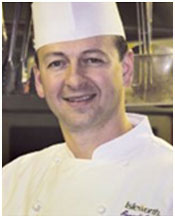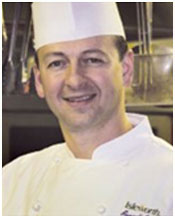Isleworth Country Club
by David Meyers
Russell – Your culinary journey is most remarkable! Share with us how you caught the culinary bug and your travels to date.
A – I grew up in Pittsburgh and I started working in restaurants immediately. In fact, I have only worked in our industry and have never straying for thirty three years now. Pittsburgh at that time was the third largest and most influential ACF chapter. I recall going to general meetings with 150 to 200 chefs in attendance. Mr. Ferdinand Metz, CMC was President and there was always a great deal of talk about nutrition, competition and continuing education – it was a very progressive chapter. I recall most chefs wore suits to the meetings back then.
I had the good fortune of starting my career in the kitchen of a certified executive chef. That level of proficiency and professionalism had a great effect on me. I noted the respect this individual commanded from all those working around him, he seemed to know everything. Coming up in that environment (Pittsburgh’s culinary scene, don’t laugh, it’s a better food town than many people think!) made it was necessary to compete at least once during my apprenticeship; many of my colleagues at that time enjoyed the competitions and we competed regularly. Unaware of the influence the environment provided me at that time, it’s clear now that it set the pace of achievement and continued development of my craft and career.
One of the greatest things our industry has to offer is travel, as soon as I thought I could afford to make it on my own I left Pittsburgh for new England – Johnson & Wales, West Virginia – The Greenbrier, Florida – The Colony Hotel and the Caribbean – Carambola Beach Resort then off to the west coast to California and the Century Plaza Hotel, then the CIA in New York to teach while preparing for the CMC exam. An enjoyable journey so far.
Russell – what inspired you to try-out for the Culinary Olympic Team while you were an instructor at the CIA?
A – It was that original image of the ideal career that was created in Pittsburgh. I thought that was what everyone was supposed to do (compete and try out for the Olympic team). As I looked at industry leaders of the time, the Timothy Ryan’s, Dan Huglier’s, Hartmut Handke’s and the Mark Erickson’s of the world, “I tried to pattern my career as closely to theirs as was possible”. I watched them graduated from a culinary school, work in the industry and compete on the Olympic team, then returned to the CIA to work and prepare for the CMC test. This seemed to me to be the perfect plan for a solid career in the culinary industry. It really just seemed like a natural next step in the sequence of things for my career. I didn’t need to be convinced that the international travel was going to be interesting or that the Olympic experience would help refine my skills. I guess when you have the opportunity to follow your heroes and mentors you do it!
Working at the CIA is one of the greatest career opportunities I have been fortunate enough to have experienced. I truly felt that I was in the jet stream of culinary knowledge during my entire 6 years at the CIA, both teaching and learning the whole time. I could have ANY and I mean any culinary question answered or demonstrated for me with just a short walk down the hall to a particular classroom where one of the more than 100 chefs with global culinary backgrounds would be happy to explain the nature of a certain dish and share their secrets.
Russell – I have the greatest regard for teachers, particularly those instructing future culinarians and you have mentored many. Your approaches towards continuing professional development are at time a bit unconventional and most refreshing. Share with us few unique experiences that make you and your organization better operators.
A – It very well could sound strange hearing that a chef is taking classes and earning a degree in alternative medicine. How I came to the decision that I needed to learn more about alternative medicine is that during the past 33 years as a cook I have, as all cooks do, had the opportunity to watch and learn about our nation’s food supply. I have noticed a steady decline in the quality of produce available through both retail and wholesale markets and have come to learn about the techniques used to raise and slaughter our cattle and discovered similar quality issues related to the farming of fish, aquaculture, and I have to say it is not all good! During the same period of time I observed the health of my family and others close to me and was compelled to make correlations between the items I watch people eat and their related, or lack of health they experience; here again not all favorable news.
Once you begin to make these types of connections between food and health invariably you have to ask yourself some difficult questions like, what is the best/purest food to eat (and serve)? Might that be organic produce? Grass feed beef? Wild caught fish? Does everything we eat need to be organic? These questions don’t just lead out of the kitchen and onto the farm but beyond into our health care facilities and our government agencies like the FDA and USDA, I’m sure you are getting the idea and picture by now.
How can I protect myself and my family? Become knowledgeable. Alternative Medicine is different from western medicine practices. Alternative Medicine is the study of different global approaches to healthcare. Since the majority of the world cannot afford the high expense required to cure every illness, they must be proactive and maintain health as opposed to waiting for disease to occur and then trying to cure it. This is far more practical and much less expensive too! Today in America, I believe we surrender far too much responsibility for our health to our doctors and healthcare providers. Typically we visit our doctors today and ask them to quickly heal the chronic disease that we have worked to develop over decades because of our sedentary lifestyles and bad eating habits. Don’t get me wrong, western medicine has its benefits. In trauma care and the treatment of advanced disease is where western medicine has most promise. This is precisely where alternative medicine is not as effective because it relays on the slower processes of nature.
Good food, water and air supplies combined with an active lifestyle and when needed a holistic approach to healthcare. Modalities like Traditional Chinese medicine; Naturopathic medicine and Ayurveda are just 3 of many healthcare alternatives that make use of herbs instead of pharmaceuticals that may have some positive effect on disease states but also put a heavy burden on the organs that must rid the body of those unwanted unnatural drugs. Making use of treatments like acupuncture that work to restore balance from within instead of antibiotics that destroy both harmful and beneficial organisms are a hallmark of alternative medicine.
The net take away of my alternate medical degree is that I need to take ownership for my own health. I need to educate myself on all related topics, seek out the best foods from the best sources and use what I have learned in the professional as well as the home kitchen to prepare and serve the purest foods to my family and members. Many of our members are at a point in their lives where they are very interested in maintaining health. We are in a great position to help them by providing healthy options on a daily basis.
Another interesting twist, I guess, would be learning that that I’m planning to take classes from The International Butler Institute. Sounds crazy? One day I noticed my GM was reading a book entitled Richistan and asked if I could read the book when he finished. In this book about the current wealthy of this country (perhaps your members) I learned that butler schools are a booming business because there is a need for a high quality professional to manage numerous household duties including massive home entertainment components, elaborate security systems, full contact travel schedules and the daily meal service of all family members and pets of this growing demographic. I have worked in the kitchen, behind the bar and in the dining rooms of restaurants, banquet halls and clubs. Over the years and I have made a studied the details of cooking, beverage and the art of serving them in the most professional way but have given little thought to the art and craft of etiquette. Just like the finishing schools our sisters attended to refine their social skills, we club professionals need to have a better grasp of the rules of etiquette so we may better serve our members and guest, earn and maintain their respect and lead the Hospitality industry with a new standard of service.
Editors Comments – Most inspiring! Russell’s passion for his craft and industry are unquestionable as is his vision and insight second to none!



